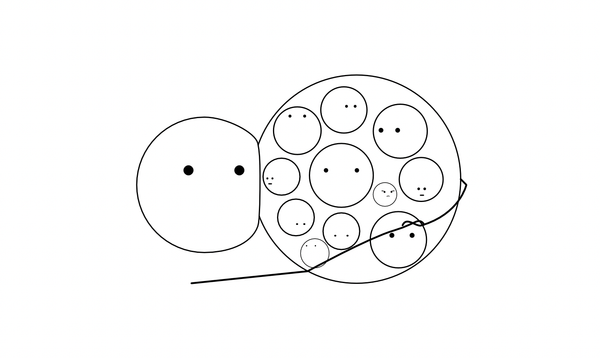Looking at authoritarianism as steeped deeply in binary cognition

Acknowledging that cognition can be built to be steeped deeply in binaries helps me understand why our attempts to bridge with empathy fails. They literally cannot see other options. If we want something different, we have to shut down their access to think they can make decisions for us.
This is speculative. It is not a nut I've cracked, but something I've been thinking about and have used to good effect in my personal life. As we start seeing more fallout to inhuman decisions, it's worth sharing.
Baseline
So, what happens with data and in some human cognition as a binary is applied is more complicated than many assume.
The upshot is: in binaries, the "yes" is the focus; all the possibilities that could have happened are lost in a fuzzy-no. That includes everything, from the most reeking nuclear possibilities, to things that would have fixed millions of issues on top of the at-hand context. It's how our computers function, from hardware to data to interface elements and everything in between. We're subtly reminded of binaries all the freaking time.
And some people – not just authoritarians – use a cognitive trick if they are really tightly focused on binary: what-happened is the only thing that matters in their memory, too.
But it's possible to take it too far. People can start thinking that, because they are alive, they made a good decision. The best decision. The greatest decision ever.
Then they did it again, because they lived to see another day. Then years and decades.
Which makes it very easy to start thinking they only make good decisions. That's the first set of mislogic, embedded as a potential in binaries translated from the multitudinous options of reality.
The second set of mislogic
When someone can dictate "what works" for others, what happens when they think they only make good decisions?
They can grow to think no one could know our own lives better than their perfect selves, no matter how disconnected and dismissive from the third-person life they might be.
If that idea that they cannot make bad decisions – they cannot have chosen any other thing but the single possible perfect answer – how do they understand non-first-person pain?
Blame the person for not navigating the terrain correctly. Dismiss the person's pain as a trick, or exaggeration, or hysteria. Or, worse: they aren't human enough, relegated to fuzzy potential, the space of no-go/go/wrong.
They technically could choose a few routes to manage the cognitive dissonance. But if someone really loves binary, and has deeply involved their self image in their perfection: these are the logical answers.
Breaking it down
The mislogic base
Remember, the posit is that they only see the positive forms of their binary decisions to date. Behind them is a string of decisions that have been proven correct by their ongoing existence.
You had a cinnamon roll: go.

Juxtapose this with the more realistic potential of a number of ways forward, both positive and negative, all of which were survivable, and we can start seeing that there's something amok.
You want a cinnamon roll. There's twenty reasons not to have it, with yes probabilities also weighing in (so yummy, just 2 hours to make from scratch, 5 minute walk away...). But, at one point you decided it was happening: go.

The authoritarian's binary state is focused on the emphatic positive form, not the space with noisy possibilities.
The pattern becomes process – a shortcut cognition. That emphatic positive drowns out the few minutes any other possibility existed. The positive-form data has data because it's been tracked. Everything else was meaningless, so it wasn't tracked. Everything other than the positive form has been processed automatically, even with automation, into non-existence. By strident always-before logic, what already has reached a go-state is the right thing, and will continue to be the right thing.
You wanted a cinnamon roll. They no longer exist because of a blight that infected cinnamon trees. You are offered alternatives. None of them are cinnamon rolls: no-go, where's the cinnamon roll?

The intrinsic will / lack to change with new information
When someone is steeped deeply in binary, decisions are perfect. We have to prove something else is more perfect before it can replace what's already proven to be perfect.
However, proving something is overall more perfect is impossible without mass experimentation. That doesn't make sense in deeply steeped binary, because we already have perfect. Until the new more correct way is defined, proven, and simplified: the existing status quo is already perfect, so it stays. And experimentation isn't relevant, because they already have perfect.
That there are other things that meet the baseline formula is meaningless. No argument breaks through the simplicity of always-before.
An authoritarian wants a cinnamon roll. An existing croissant is at-hand. Cinnamon rolls have always been good, so: no-go, where's the cinnamon roll?

Whereas someone without an emphatic binary would take the available croissant without much more hesitation than they would an absent cinnamon roll.
The croissant smells good too: go

Example shift
Clarifying the fundamental mislogic
We used to track hunger. Now we don't.
So according to data, hunger no longer exists. Tales of hunger are hearsay, living in the no-go/no/wrong space. If they happen to see an actual starving person, it's all the starving's fault: look at how easy it is to navigate life to not starve. The authoritarian is perfect, so life can be perfect. Anything less than perfect, you're doing life wrong.
The emphatic positive grows spikes of rejection. Nothing beyond will be accepted as real, and their sense-making starts confabulating bridges to span the gap.
- It must be an exaggeration, they can't possibly be hungry, look there's no data to support what they're saying; or,
- It's hysteria, an emotional overreaction to a perfectly normal amount of pain; or,
- If that's not enough to shut them up (because making cognitive dissonance go away is the goal): dismiss the person's pain as a trick. They're lying to make me look bad; lying back is self-preservation and my truth.
No one is hungry. You want a gold shitter: go

Meanwhile, someone without an emphatic binary would be seeing more haze in what worked before, and even starting to see other potentials. This is even if they aren't actively trying to solve more broadly.
The US has allocated massive funding for military/border/ICE expansion and implementing AI surveillance, and have sent billions to Argentina. But the Republicans have decided that millions to feed people is bad money spent. Investing money in the future of our country by investing in the health of our people (Medicare and Medicaid) is bad money spent. In other words: killing and hegemony good, broad health/survival bad.
Now think about the deep-steeped binary approach, compared to the multitudinous potential when the actions-not-done are remembered and balanced.
You want a gold shitter: go or no-go?

Tracing the mislogic sensemaking
If a system is so far out of whack that people start dying, there are three ways out of that logical connundrum while clearing cognitive dissonance.
The first and easiest is to hold fast to the fuzz of not-yes. In an emphatic binary yes/no perception, they can't be counted. To avoid cognitive dissonance, make sure there is no data you'll agree to acknowledge.
What hunger? You want a gold shitter: go.

The second is to point out that someone, somewhere, is not dying. It's replicable! The system works! There's no reason to smudge the binary according to how they are framing it.
Harvey-the-invisible-rabbit (good man! good man!) is fine, so everything is fine; those other...things...are too stupid to eat right. You want a gold shitter: go.

The third is to make those people embody the void they live in. Let them die, even "help" them die. Poof, gone, no yammering that won't shut up so the only problem left (cognitive dissonance) is gone.
What hungry people? You want a gold shitter: go.

All those smaller nodes in the hazy positive diagram are excluded from perception in the emphatic positive binary. Add them back in, and it's clearly not binary. It's noisy, messy, and intrinsically questions the basis of authority. It's hard to continue seeing the authoritarian as someone special, with more relevance than anyone else. They become unhappy people with visions of grandeur, mollified and coddled so much they will never get out of their own way to learn.

To them, it makes sense to work to make the world reflect their binary belief. No one other than Harvey and those that are like Harvey – in ethos, in belief system, in visual scan – should exist. Which means, eventually, even Harvey will go: humans don't have rabbit ears.
In the logic of the emphatic binary, it's just the final quieting of cognitive dissonance. It brings them back to a simpler world.
Who but humans exist? You want a gold shitter: go.

Those of us who can't unsee the hungry people are at a loss about how this makes sense. Acknowledging that cognition can be built on binaries helps me understand: there is no negotiating with them, they fundamentally cannot see the harm they do. If we want something different, we have to shut down their access to think they can make decisions for us.
In our personal lives, the easy way is to walk away as soon as the behavior is noted and confirmed, and let them live in their fruitless anger. In public life, it's more complicated. The best time to void their control is before they have it. As they make more rules that support their binary views of the world, extrication gets harder, whether it's in personal life, marketing, social media, software, personal data, forms, or public life.
The glazing
There's also a behavioral component tied to time. If they can't go back in time and make a different decision, they can't always be right. If decision A was wrong it means decision B could be wrong, because the decision was made on their authority. Being right is their proof of power, conviction of strength, and evocation of intelligence. Being right, always, is the source of their confidence, which they see as the source of their power and strength. It's emphatic. It's certain. It's clear and it's simple.
Being right protects their magic. Reality bends to them, they do not bend to reality.
If a systemic malfunction escalates to mass collapse, from the authoritarian's point of view it must be ineffable – God's handiwork, punishing the sinners for sinning. Nothing else makes sense, because of the scaffolding of their binary logic.
The trick is that authoritarians are always, always, focused on what works in their lives. They can't be wrong and remain the authority, and they can't see what doesn't match their expectations. They can't imagine anyone who doesn't agree with them is honest. They can't ever be wrong.
And we can't trust them to see a croissant, let alone decide to not buy and install a gold shitter while populations worry about eating.




